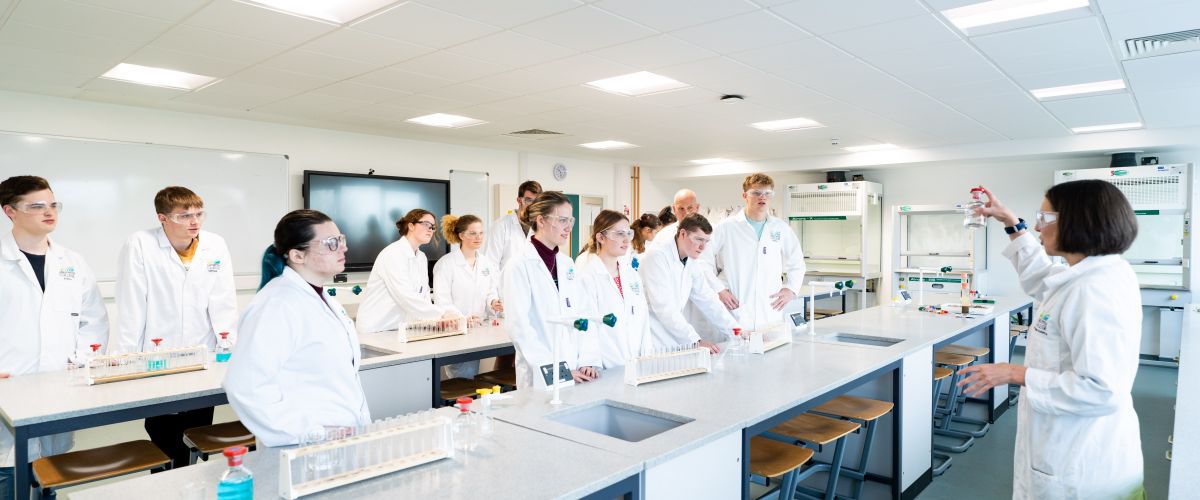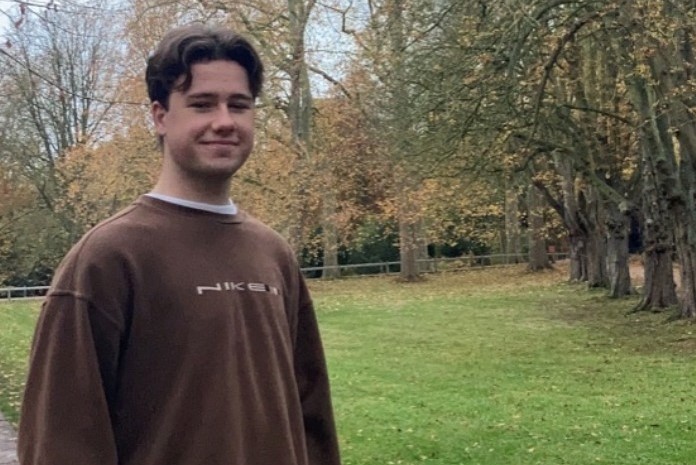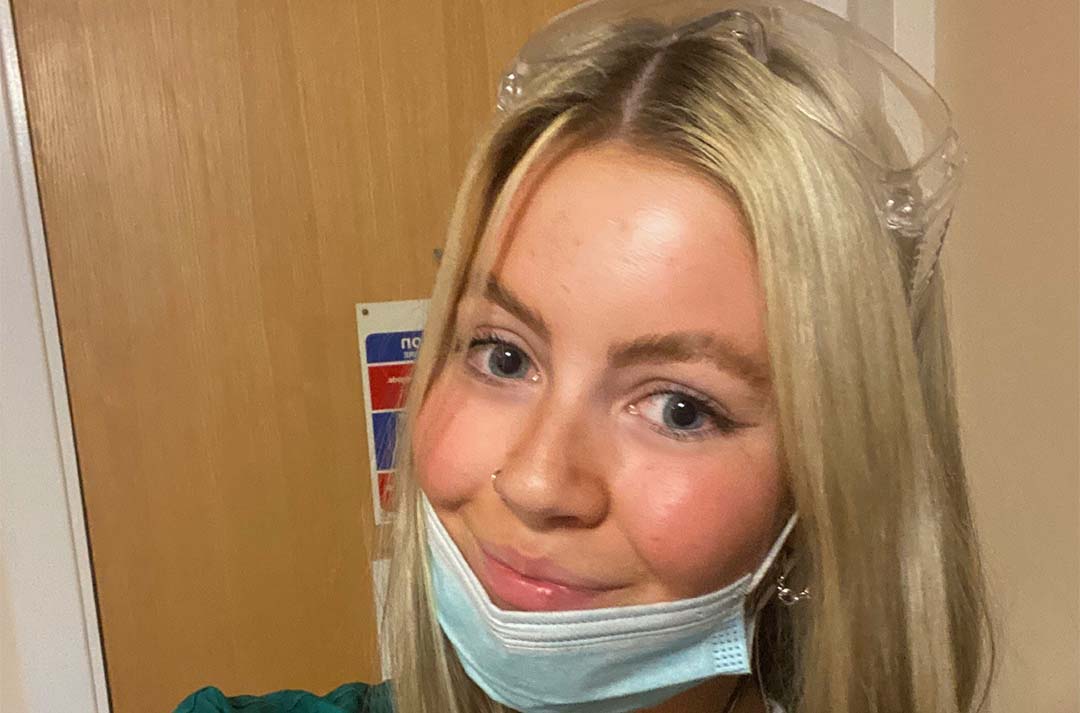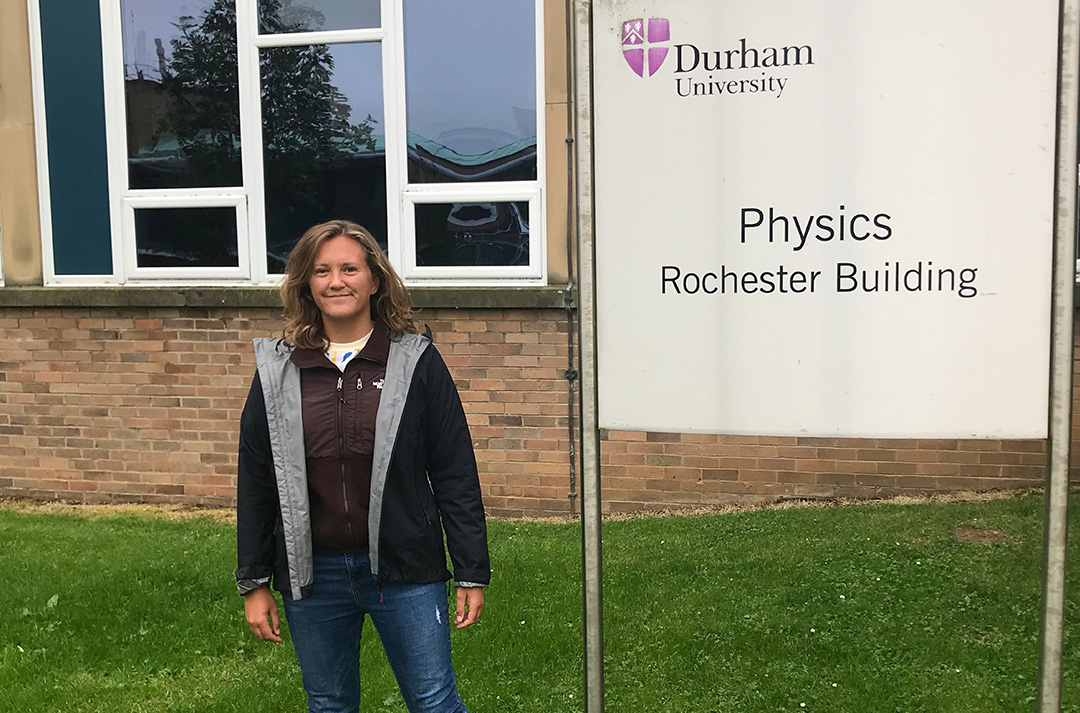A Level Chemistry
Chemistry is one of the most useful A Levels to study; it is challenging, rewarding and well respected by employers and universities alike. It draws on a wide range of subjects ranging from physical chemistry calculations to the creative nature of organic synthesis. The skills gained are extremely transferable and chemists are renowned for being adaptable scholars and desirable employees.
Key information
Science / Full Time / A Levels and Equivalent
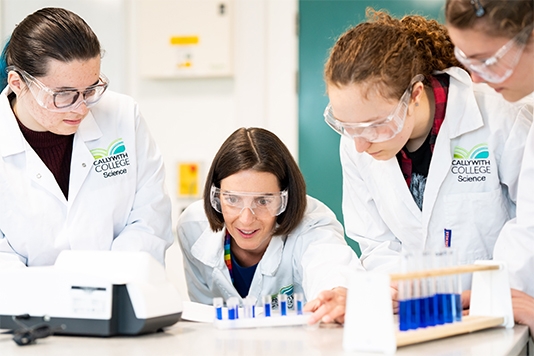
Why choose this course?
Throughout the course you will be challenged in the three main disciplines within the subject. Physical chemistry encompasses the behaviour of matter and how we can measure and dispense chemicals accurately, to allow our desired reactions to take place safely and successfully. Inorganic chemistry follows the intricate patterns of Mendeleev’s masterpiece, the periodic table. You will learn to interpret the subtle rules that allow us to make sense of the known 118 chemical elements and begin to understand how and why they are arranged in their specific order. This will then allow you to predict the behaviour and reactivity of elements that you are less familiar with. Finally, you will study organic chemistry, the specific chemistry of carbon and how it ranges from simple compounds found in crude oil, petrol and gas, to extremely complicated molecules of life such as condensation polymers and peptide chains.
You will develop your practical skills through plenty of laboratory-based experiments; you will use your mathematical skills to solve problems in a classroom or workshop environment and you will also be introduced to modern analytical techniques such as mass spectrometry, infra-red spectroscopy and nuclear magnetic resonance spectroscopy to elucidate unique chemical structures. The real-life applications of these skills are numerous; most modern medicines have been synthesised and developed by chemists working in laboratories, synthesising novel chemical entities that may have beneficial therapeutic properties. Athletes who have been caught doping have been identified by chemists using the same analytical techniques you will studying and the new wonder material of the future, graphene, has been developed and researched by scientists, including a large team of chemists.
What will I learn?
This A Level is a two-year course, with all the components being examined at the end of the teaching cycle. Practical skills will be taught and assessed throughout for practical competence; with the learning being examined in the final exams. There will be three exams at the end of the two years where all the content will be examined alongside the awarding of the practical endorsement.
Module 1- Development of Practical skills in Chemistry
Chemistry is a practical subject, throughout the program of study there are a series of required practical experiments that you will complete to demonstrate the acquisition of a variety of essential laboratory skills. These skills will be verified by the course lecturer and then examined within the written papers. The experiments will complement the theory lessons and will help reinforce the concepts being delivered.
Module 2 – Foundations in Chemistry
This module is the building block of all future chemistry; providing the necessary skills to allow you to construct chemical formulae, balance equations, perform mole calculations and perform titration experiments. It enables you to know how much material to place in a chemical reaction to allow the successful synthesis of your desired target compound.
Module 3 – The Periodic Table and Energy
This module allows you to understand the periodic table and use it to predict the behaviour of all the elements. From there you can use experimental measurements to investigate if chemical reactions occur, whether they need heating or cooling and whether they are safe to perform. You will learn about exothermic and endothermic reactions, equilibria and rates of reaction, allowing you to accurately predict chemical behaviour and devise successful reactions.
Module 4 - Core Organic Chemistry
Organic chemistry is the chemistry of carbon and by extension, the chemistry of life. You start with simple alkanes and build complexity by introducing functional groups including alkenes, alcohols, ketones, aldehydes and carboxylic acids. You will learn how to build complicated molecules and how to analyse them to confirm their identity.
Module 5 – Physical Chemistry and Transition elements
Building on the knowledge gained in the first year, this module will look at the behaviour of the transition metal elements, exotic metals such as manganese and chromium. To learn about their unique properties, you will investigate their colour changes, precipitation reactions and the speed at which they react. You will explore how much energy is involved in a chemical reaction and study whether your chosen chemicals are likely to react or not given a set of reaction conditions.
Module 6 – Organic Chemistry and Analysis
Building on the knowledge gained during module 4, you will study more complex functional groups, more sophisticated molecules and more sensitive analytical techniques. This will allow you to synthesize organic molecules and have an awareness of how to confirm their identity and purity using a variety of analytical techniques.
Assessment Arrangements
Your achievement in this subject is dependent upon excellent attendance, punctuality and effort. You will learn in a supportive atmosphere, using a variety of assessment methods. You will be assessed through end of topic tests under timed conditions in class, regular homework questions and through completion of class activities. You will then be given feedback on your progress in order to improve. Investigative skills and understanding are a vital part of the scientific process and you will be expected develop your practical proficiency throughout the course. You will undertake mock examinations on each unit in advance of your final exams. You will sit three formal A Level exams at the end of your two years of study. A Level grades will be based only on marks for written exams, and your practical endorsement will be assessed and awarded separately as pass or fail.
Information & Support
You will be expected to undertake at least 4-6 hours of independent study time per week. Throughout the year you will be able to access additional support through the course virtual learning environment, workshops, as well as a variety of additional opportunities to stretch and challenge the most able students. We encourage you to proactively engage with the support available in order to reach your full potential.
What will I need?
Five GCSEs at grade 4 or above including grade 6 or above in chemistry or combined science. Mathematics at grade 6 or above and English Language or Literature at grade 5 or above.
Where will it take me?
If you want to study medicine, dentistry, pharmacy or veterinary science then A Level Chemistry is essential. In addition, an understanding of chemistry is desirable for the study of many other subjects and A Level Chemistry is valued highly by universities as it will equip you well for further study in the sciences as well as areas such as law and finance. Studying the chemical sciences at university level provides you with many skills such as problem solving, communication, creativity and teamwork; hence chemical scientists are much sought after and can pursue careers in many exciting and varied fields of work.
Additional Information
We encourage all students to read widely and conduct their own research into the topics they are studying. You will be expected to undertake at least 4-6 hours of independent study time per week. There is a wide range of support material available in the Learning Resource Centres and on the course OneNote site. Throughout the year, you will be able to access additional support and opportunities to stretch and challenge you.
Awarding Body:
OCR Chemistry A Specification
To obtain more information about this course, please call: 01208 224000 or email enquiry@callywith.ac.uk
